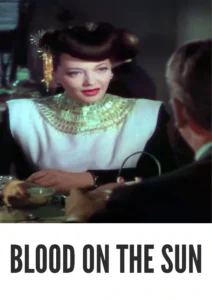Contact: info@alwanfilm.com
Video Sources 0 Views
- Watch trailer
- Blood on the Sun


Synopsis
Table of Contents
ToggleReview: Blood on the Sun 1945 Colorized – A Riveting Thriller Set in Pre-War Japan

Introduction
Blood on the Sun, released in 1945, is a captivating thriller set in the tumultuous backdrop of pre-World War II Japan. Directed by Frank Lloyd and starring James Cagney, this film offers a gripping blend of espionage, action, and political intrigue. In this review, we’ll delve into the riveting world of Blood on the Sun and its enduring appeal among audiences.
Check The Full Colorized Movies List
Check Our Colorized Movies Trailer Channel
Understanding Blood on the Sun 1945 Colorized: Director, Cast, and Genre
Directed by Frank Lloyd, Blood on the Sun features a stellar cast led by the charismatic James Cagney. The film falls under the thriller genre, known for its suspenseful plotlines, high stakes, and adrenaline-pumping action sequences.
Exploring the World of Blood on the Sun 1945 Colorized: Plot and Characters
Blood on the Sun follows the story of Nick Condon, an American journalist living in Tokyo, who uncovers a deadly conspiracy orchestrated by the Japanese government. As Condon delves deeper into the sinister plot, he finds himself embroiled in a dangerous game of cat and mouse, where betrayal lurks at every corner and the fate of nations hangs in the balance.
The Art of Film Colorization
While Blood on the Sun was originally filmed in black and white, its early colorized version adds a new layer of depth to its vibrant setting and dynamic action sequences. The colorization process enhances the film’s visual appeal and captures the rich cultural tapestry of pre-war Japan with striking clarity.
Early Colored Films: A Brief History
The history of early colored films is marked by innovation and experimentation as filmmakers sought to enhance the visual appeal of their movies. From hand-tinted frames to pioneering technicolor processes, the evolution of colorization techniques transformed the cinematic landscape, offering audiences a new way to experience the excitement and spectacle of motion pictures.
Blood on the Sun (1945) and Its Early Colored Version
The decision to release Blood on the Sun in a colorized format was made with the intention of immersing audiences in the vibrant world of pre-war Japan and enhancing the film’s visual impact. While some purists may prefer the original black and white version, the early colorized edition of Blood on the Sun adds a new layer of depth to its dynamic action sequences and captures the exotic allure of its setting with breathtaking clarity.
The Debate Over Film Colorization
The debate over film colorization continues to divide audiences and industry professionals alike. While some argue that colorization breathes new life into classic films and makes them more accessible to modern audiences, others maintain that it compromises the artistic integrity of the original work. As technology advances and filmmaking techniques evolve, the debate over colorization remains a topic of ongoing discussion within the film community.
Examining Blood on the Sun (1945) as an Early Colored Film
Viewing Blood on the Sun in its early colorized iteration offers audiences a fresh perspective on its vibrant setting and dynamic action sequences. The colorization process enhances the film’s visual appeal and captures the exotic allure of pre-war Japan with stunning clarity. As viewers are drawn into the heart-pounding thrills and suspense of Nick Condon’s perilous journey, they are treated to a visual spectacle that immerses them in the rich cultural tapestry of East Asia.
Influence and Legacy: Blood on the Sun 1945 Colorized’s Impact on Cinema
Blood on the Sun is widely regarded as a classic of the thriller genre that continues to captivate audiences with its suspenseful plotlines, high stakes, and dynamic action sequences. Its portrayal of pre-war Japan and its exploration of espionage and political intrigue have left an indelible mark on cinema, inspiring countless filmmakers and influencing the way thrillers are made and appreciated to this day.
Director’s Cinematic Legacy: Beyond Blood on the Sun 1945 Colorized
Frank Lloyd’s directorial legacy extends far beyond Blood on the Sun, encompassing a diverse body of work that includes acclaimed films such as Mutiny on the Bounty and Cavalcade. As one of the most respected filmmakers of his generation, Lloyd was known for his ability to craft compelling narratives that resonated with audiences around the world. Blood on the Sun stands as a testament to his talent and creativity, solidifying his reputation as one of the great auteurs of classic Hollywood cinema.
Themes Explored in Blood on the Sun 1945 Colorized
At its core, Blood on the Sun explores themes of espionage, political intrigue, and the clash of cultures in the volatile backdrop of pre-war Japan. Through its suspenseful plotlines and dynamic action sequences, the film offers a nuanced portrayal of the human condition, challenging viewers to confront their own beliefs about loyalty, honor, and sacrifice as they navigate the treacherous world of international espionage.
Reception and Controversy Surrounding Blood on the Sun 1945 Colorized
Upon its release, Blood on the Sun received widespread critical acclaim for its suspenseful plotlines, dynamic action sequences, and captivating performances. While the decision to release the film in a colorized format sparked debate among purists, its enduring popularity has cemented its status as a timeless classic of the thriller genre.
Where to Watch Blood on the Sun 1945 ColorizedOnline
For those eager to experience Blood on the Sun for themselves, the film is readily available on popular streaming platforms such as Amazon Prime Video, Google Play Movies, and iTunes. Whether viewed in its original black and white format or its early colorized iteration, Blood on the Sun offers a cinematic experience that is both thrilling and visually stunning.
FAQs About Blood on the Sun 1945 Colorized
1. Is Blood on the Sun based on a true story?
No, Blood on the Sun is a fictional film that explores the world of espionage and political intrigue in pre-war Japan through the eyes of its protagonist, Nick Condon. While the film’s storyline may draw inspiration from real-life events, its characters and plot are works of fiction.
2. Who starred in Blood on the Sun?
Blood on the Sun stars James Cagney in the role of Nick Condon, an American journalist living in Tokyo who uncovers a deadly conspiracy orchestrated by the Japanese government. He is supported by Sylvia Sidney, Wallace Ford, and Rosemary DeCamp, among others.
3. What is the central message of Blood on the Sun?
At its core, Blood on the Sun explores the themes of espionage, political intrigue, and the clash of cultures in the volatile backdrop of pre-war Japan. Through its suspenseful plotlines and dynamic action sequences, the film offers a nuanced portrayal of the human condition, challenging viewers to confront their own beliefs about loyalty, honor, and sacrifice as they navigate the treacherous world of international espionage.
4. Why was Blood on the Sun released in a colorized format?
The decision to release Blood on the Sun in a colorized format was made with the intention of immersing audiences in the vibrant world of pre-war Japan and enhancing the film’s visual impact. While some purists may prefer the original black and white version, the early colorized edition of Blood on the Sun adds a new layer of depth to its dynamic action sequences and captures the exotic allure of its setting with breathtaking clarity.
5. What is the legacy of Blood on the Sun?
Blood on the Sun is widely regarded as a classic of the thriller genre that continues to captivate audiences with its suspenseful plotlines, high stakes, and dynamic action sequences. Its portrayal of pre-war Japan and its exploration of espionage and political intrigue have left an indelible mark on cinema, inspiring countless filmmakers and influencing the way thrillers are made and appreciated to this day.
6. Are there any sequels or remakes of Blood on the Sun?
No, there have been no official sequels or remakes of Blood on the Sun. However, the film’s enduring popularity has inspired countless reinterpretations and homages in various media. Nonetheless, none have captured the suspenseful plotlines and dynamic action sequences of the original 1945 classic.
7. Where can I watch Blood on the Sun online?
For those eager to experience Blood on the Sun for themselves, the film is readily available on popular streaming platforms such as Amazon Prime Video, Google Play Movies, and iTunes. Whether viewed in its original black and white format or its early colorized iteration, Blood on the Sun offers a cinematic experience that is both thrilling and visually stunning.
Conclusion
In conclusion, Blood on the Sun (1945) stands as a gripping thriller set against the backdrop of pre-war Japan, featuring suspenseful plotlines, dynamic action sequences, and captivating performances. Whether viewed in its original black and white format or its early colorized iteration, the film offers a cinematic experience that is both thrilling and visually stunning. As viewers are drawn into the heart-pounding thrills and suspense of Nick Condon’s perilous journey, they are treated to a visceral spectacle that immerses them in the rich cultural tapestry of East Asia. Blood on the Sun remains a timeless classic that continues to enthrall and inspire audiences around the world.











